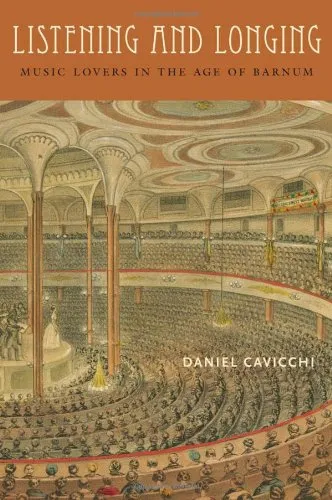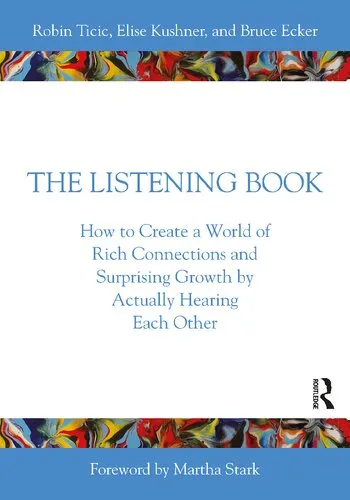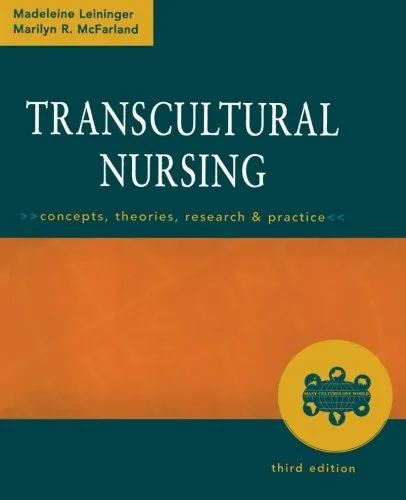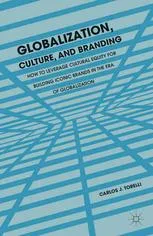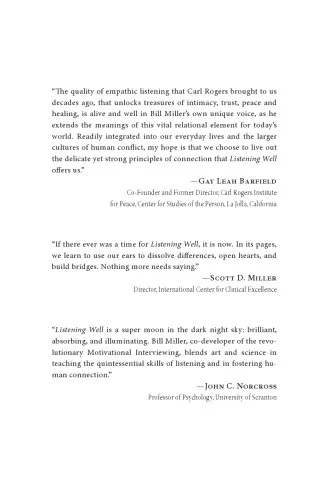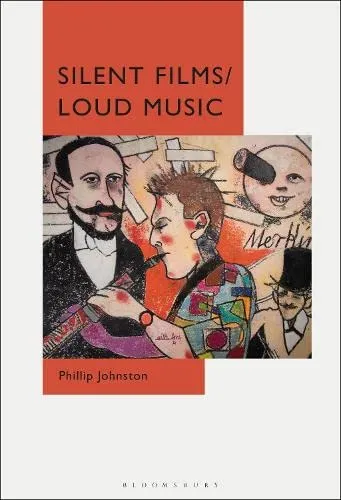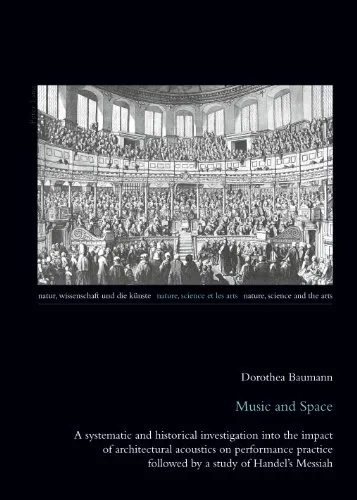Listening and Longing: Music Lovers in the Age of Barnum (Music Culture)
4.5
بر اساس نظر کاربران

شما میتونید سوالاتتون در باره کتاب رو از هوش مصنوعیش بعد از ورود بپرسید
هر دانلود یا پرسش از هوش مصنوعی 2 امتیاز لازم دارد، برای بدست آوردن امتیاز رایگان، به صفحه ی راهنمای امتیازات سر بزنید و یک سری کار ارزشمند انجام بدینکتاب های مرتبط:
معرفی کتاب
کتاب Listening and Longing: Music Lovers in the Age of Barnum اثری بینظیر و پژوهشی ژرف از «دانیل کاویچی» است که به بررسی رابطه شنوندگان موسیقی و تأثیر اجتماعی-فرهنگی آن در قرن نوزدهم آمریکا میپردازد. در این دوره، موسیقی به بخش مهمی از زندگی مردم تبدیل شد و این کتاب با پرداختن به جنبههای مختلف شنیدن و دلبستگی انسانها به موسیقی این پدیده را کاوش میکند.
خلاصهای از کتاب
«Listening and Longing» نگاهی جامع به جامعه آمریکای قرن نوزدهم دارد؛ دورانی که با تغییرات عمده در صنعت و فرهنگ همراه بود. با رشد پدیدههای عمومی نظیر کنسرتها و ظهور شخصیتهایی همچون P.T. Barnum، موسیقی به بخش جداییناپذیر از جامعه تبدیل شد. این کتاب نقطه تقابل میان مخاطبان عام موسیقی، هنرمندان و تمایلات فرهنگی جدید را بررسی میکند. نویسنده با استفاده از آرشیوهای تاریخی، نامهها، خاطرات و گزارشهای رسانهای، شرحی از تجربیات معنوی، احساسی و حتی اجتماعی مردم از لحظههای شنیدن موسیقی را ارائه میدهد.
در کنار آن، کتاب به مفاهیمی نظیر تجاریسازی موسیقی، ظهور سرگرمیهای عمومی، و رشد اجتماعی کلاسهای متوسط پرداخته و نشان میدهد که چگونه عشق به موسیقی توانست نقش مهمی در ایجاد هویت فرهنگی و اجتماعی ایفا کند. با رویکردی میانرشتهای، «کاویچی» نه تنها جنبههای فرهنگی، بلکه روانشناسی مخاطبان و تأثیرات عمیقتر موسیقی را نیز کاوش کرده است.
نکات کلیدی
- تأثیر موسیقی بر ایجاد هویت اجتماعی و فرهنگی در میان مردم قرن نوزدهم.
- نقش P.T. Barnum در گسترش فرهنگ موسیقی و رویدادهای عمومی.
- رشد فناوری و نقش آن در دسترسی به موسیقی برای مخاطبان وسیعتر.
- تفاوت میان شنوندگان حرفهای و مخاطبان عام موسیقی.
- پژوهشهای تاریخی درباره ارتباط بین شنیدن موسیقی و تحولات احساسی و روانی.
نقلقولهای معروف از کتاب
"To listen deeply is to connect profoundly with the world and one’s emotional core."
"Music transcends both time and space; it becomes the narrative of one’s inner life."
"In Barnum’s age, music was no longer just an elite pastime; it was the heartbeat of the common man."
چرا این کتاب اهمیت دارد؟
«Listening and Longing» فراتر از یک کتاب تاریخی است. این اثر، پلی است که میان تحقیق علمی و جنبههای معنوی و انسانی موسیقی ساخته شده است. در زمانی که تکنولوژی و سرگرمیهای دیجیتال شیوه گوش دادن به موسیقی را دگرگون کردهاند، فهم ریشههای تاریخی و فرهنگی این تجربه انسانی ضروری است.
اهمیت دیگر کتاب در روششناسی دقیق و نگاه میانرشتهای است که تاریخ، جامعهشناسی، موسیقیشناسی و روانشناسی را در هم آمیخته است. کاویچی در این اثر به ما نشان میدهد که چگونه شنیدن میتواند تاریخ را بسازد و زندگی انسانها را شکل دهد. این کتاب نه تنها برای علاقهمندان به تاریخ موسیقی، بلکه برای کسانی که به دنبال تحقیق در زمینههای اجتماعی، فرهنگی و حتی فلسفی هستند، ارزشمند و الهامبخش خواهد بود.
Introduction to "Listening and Longing: Music Lovers in the Age of Barnum"
"Listening and Longing: Music Lovers in the Age of Barnum" by Daniel Cavicchi provides a fascinating exploration of the way music was experienced, appreciated, and embodied by 19th-century American audiences. This book delves into the cultural and social impact of music during a time when public entertainment was undergoing dramatic changes, driven by larger-than-life figures like P.T. Barnum. Through meticulously researched historical accounts and an intimate portrait of early American "music lovers," the book reveals how listening became an active, emotional, and communal experience. By uncovering the personal and collective journeys of music enthusiasts in an era often overshadowed by spectacle and commercialism, this work brings fresh perspectives to the fields of music history, sociology, and cultural studies.
Set against the backdrop of rapid industrialization, urbanization, and the advent of new entertainment technologies, "Listening and Longing" challenges us to rethink historical assumptions about musical appreciation and fandom. Cavicchi’s narrative connects the dots between America’s 19th-century fascination with music and its evolution into today’s omnipresent musical culture. From the invention of the modern concert experience to the birth of celebrity culture, the book captures the essence of a nation seeking meaning and identity through the act of listening deeply and yearning intensely for transcendent experiences.
Detailed Summary of the Book
The book begins by setting the stage in an America that is rapidly transforming. With the rise of urban centers and public forums for entertainment, musical events begin to shift from impromptu gatherings to organized spectacles. P.T. Barnum, known for his circus and knack for spectacle, played a pivotal role in shaping how Americans consumed music. Through concerts featuring vocalists such as Jenny Lind—the "Swedish Nightingale"—Barnum brought music to the mainstream while simultaneously feeding a nationwide hunger for emotional connection and cultural refinement.
Daniel Cavicchi highlights how the act of listening itself became a cultural phenomenon. During the 19th century, attending live performances was not just about hearing music; it was about participating in a shared social and emotional experience. The book introduces a variety of "music lovers," from devoted fans who traveled long distances to attend performances, to everyday people who collected sheet music and taught themselves to play instruments at home. Cavicchi uses personal letters, diaries, and other archival materials to illustrate how deeply music permeated the lives of individuals and communities.
A recurring theme throughout the book is the struggle between commercialism and authenticity. On one hand, music became a commodity, marketed and sold to eager crowds. On the other hand, listeners and performers sought genuine, often spiritual, connections through their musical encounters. By portraying the tensions of this duality, the author captures the essence of a period in music history that would ultimately shape much of what we know about contemporary fandom and the music industry.
Key Takeaways
- The rise of public concerts and Barnum’s influence marked the beginning of modern musical entertainment.
- Listening to music in the 19th century was deeply tied to one’s identity, emotions, and social class.
- Music fandom and longing were not isolated phenomena but integral to the broader cultural and social shifts of the time.
- The tension between commercialization and authenticity in music began long before the digital era.
- Listening is not a passive act; it is historical, cultural, and deeply personal.
Famous Quotes from the Book
"Listening is not merely the act of hearing but the act of longing—for connection, for transcendence, for meaning."
"The nineteenth-century concert hall was less a place of passive observation and more a sacred space for collective introspection."
Why This Book Matters
"Listening and Longing: Music Lovers in the Age of Barnum" is not just a history of music in 19th-century America; it is a study of human emotion, community, and cultural growth. By focusing on audiences rather than just performers, Cavicchi provides an empathetic look at the social transformations surrounding music. His attention to the intimate experiences of music listeners reminds us that music has always been more than sound—it has been a profound influence on identity, a communal bond, and a source of yearning that transcends time and place.
In today’s world, where music consumption often happens through digital streams and playlists, this book serves as a powerful reminder of what it means to truly listen. It challenges readers to consider their own relationship with music and how it shapes their lives. Ideal for historians, musicologists, and casual readers alike, "Listening and Longing" bridges the gap between a distant past and the ever-evolving present, proving that the love for music is as timeless as it is transformative.
دانلود رایگان مستقیم
شما میتونید سوالاتتون در باره کتاب رو از هوش مصنوعیش بعد از ورود بپرسید
دسترسی به کتابها از طریق پلتفرمهای قانونی و کتابخانههای عمومی نه تنها از حقوق نویسندگان و ناشران حمایت میکند، بلکه به پایداری فرهنگ کتابخوانی نیز کمک میرساند. پیش از دانلود، لحظهای به بررسی این گزینهها فکر کنید.
این کتاب رو در پلتفرم های دیگه ببینید
WorldCat به شما کمک میکنه تا کتاب ها رو در کتابخانه های سراسر دنیا پیدا کنید
امتیازها، نظرات تخصصی و صحبت ها درباره کتاب را در Goodreads ببینید
کتابهای کمیاب یا دست دوم را در AbeBooks پیدا کنید و بخرید
1338
بازدید4.5
امتیاز0
نظر98%
رضایتنظرات:
4.5
بر اساس 0 نظر کاربران
Questions & Answers
Ask questions about this book or help others by answering
No questions yet. Be the first to ask!
